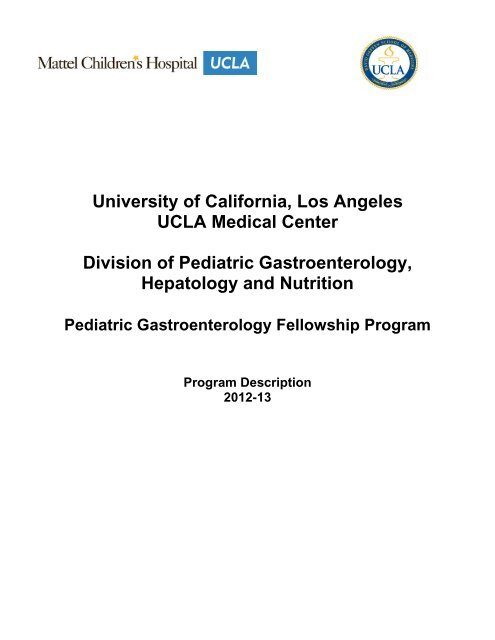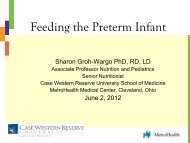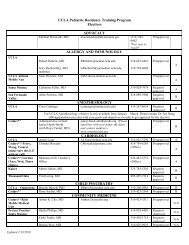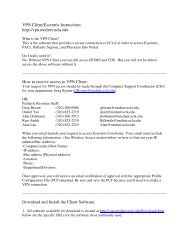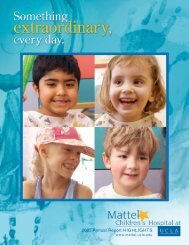GOALS AND OBJECTIVES - Mattel Children's Hospital at UCLA
GOALS AND OBJECTIVES - Mattel Children's Hospital at UCLA
GOALS AND OBJECTIVES - Mattel Children's Hospital at UCLA
You also want an ePaper? Increase the reach of your titles
YUMPU automatically turns print PDFs into web optimized ePapers that Google loves.
University of California, Los Angeles<br />
<strong>UCLA</strong> Medical Center<br />
Division of Pedi<strong>at</strong>ric Gastroenterology,<br />
Hep<strong>at</strong>ology and Nutrition<br />
Pedi<strong>at</strong>ric Gastroenterology Fellowship Program<br />
Program Description<br />
2012-13
Gastroenterology Fellowship Program Description<br />
07/2012<br />
GASTROENTEROLOGY FELLOWSHIP TRAINING PROGRAM<br />
INTRODUCTION<br />
The Pedi<strong>at</strong>ric Gastroenterology Fellowship Program <strong>at</strong> <strong>UCLA</strong> is an ACGME accredited three-year<br />
training program th<strong>at</strong> provides comprehensive training in pedi<strong>at</strong>ric gastroenterology, hep<strong>at</strong>obiliary<br />
diseases, nutrition support and pre- and post- liver transplant and intestinal transplant p<strong>at</strong>ient care.<br />
Our program is specifically directed towards individuals interested in pursuing academic careers in<br />
clinical and/or research medicine. The program is under the direction of S.V. McDiarmid, MD.<br />
The Pedi<strong>at</strong>ric Gastroenterology, Hep<strong>at</strong>ology and Nutrition Division is a multidisciplinary program<br />
th<strong>at</strong> brings multiple specialists together to provide consult<strong>at</strong>ion, diagnosis and medical management<br />
of children with gastrointestinal, hep<strong>at</strong>obiliary and nutritional disorders. The Division members are<br />
n<strong>at</strong>ionally and intern<strong>at</strong>ionally recognized for their expertise in IBD, hep<strong>at</strong>obiliary diseases, liver<br />
transplant<strong>at</strong>ion, intestinal rehabilit<strong>at</strong>ion and transplant<strong>at</strong>ion, diarrheal diseases, gastrointestinal<br />
motility disorders, nutrition support, gastroesophageal reflux, and celiac disease.<br />
The Division has active research programs in numerous clinical and basic research areas. There<br />
are several NIH funded research projects in areas such as intestinal stem cell development,<br />
intestinal failure in children, outcomes after liver transplant<strong>at</strong>ion, H. pylori signaling systems and<br />
p<strong>at</strong>hogenesis. Active clinical investig<strong>at</strong>ion is ongoing in several areas including: IBD, diarrheal<br />
disorders, genetics of chronic intestinal pseudo-obstruction, immunosuppression in pedi<strong>at</strong>ric liver<br />
transplant<strong>at</strong>ion.<br />
MISSION<br />
The <strong>UCLA</strong> Pedi<strong>at</strong>ric Gastroenterology Fellowship Program has three missions:<br />
1. P<strong>at</strong>ient Care: We strive to improve the standard of practice and ensure the highest quality<br />
of care to children in our hospital. We care for children with the highest respect for their<br />
precious lives in a family-centered, compassion<strong>at</strong>e and caring environment, and utilizing<br />
evidence-based approaches to tre<strong>at</strong>ments th<strong>at</strong> are regularly evalu<strong>at</strong>ed and upd<strong>at</strong>ed.<br />
2. Research: To pursue new knowledge through high quality research th<strong>at</strong> explores unanswered<br />
questions and challenges and refines previously established ideas on mechanisms of disease<br />
and clinical aspects of pedi<strong>at</strong>ric gastroenterology. We engage in clinical, transl<strong>at</strong>ional and basic<br />
science research, aimed <strong>at</strong> improving children’s lives. We work collabor<strong>at</strong>ively within and<br />
outside our institution in order to gener<strong>at</strong>e important discoveries th<strong>at</strong> enhance medical practice<br />
and inform the medical community and the public of evidence-based approaches to pedi<strong>at</strong>ric<br />
gastroenterology, hep<strong>at</strong>ology and nutrition.<br />
3. Educ<strong>at</strong>ion: Our goal is to impart knowledge, instill excitement for learning, and transl<strong>at</strong>e<br />
and refine questions into focused areas of research for our trainees. We train future leaders in<br />
pedi<strong>at</strong>ric gastroenterology, hep<strong>at</strong>ology and nutrition who work in an academic or priv<strong>at</strong>e setting<br />
and deliver the highest quality care to their p<strong>at</strong>ients. We accomplish this by:<br />
Allowing fellows to pursue their interests in a structured manner in order to produce<br />
quality research addressing significant questions in pedi<strong>at</strong>ric gastroenterology medicine.<br />
Promoting a collegial environment th<strong>at</strong> provides ample opportunity for fellows to grow<br />
and learn from their own and others’ experiences.<br />
2
Gastroenterology Fellowship Program Description<br />
07/2012<br />
UNIQUE INFORMATION ABOUT THE PROGRAM<br />
Training provided in an intern<strong>at</strong>ionally renowned tertiary care medical center, Ronald Reagan<br />
<strong>UCLA</strong> Medical Center, and major children’s hospital, <strong>M<strong>at</strong>tel</strong> Children’s <strong>Hospital</strong> <strong>UCLA</strong><br />
Outp<strong>at</strong>ient service with over 7,000 p<strong>at</strong>ient visits per year<br />
Inp<strong>at</strong>ient service with over 700 admissions per year and an average daily census of 12-15<br />
p<strong>at</strong>ients<br />
St<strong>at</strong>e-of-the-art endoscopy and diagnostic suite with over 1,500 procedures performed per year<br />
Gastrointestinal motility center where the following studies are performed: esophageal motility,<br />
pH monitoring, anorectal manometry, colonic manometry, electrogastrography<br />
Clinical and educ<strong>at</strong>ional programs include: general gastrointestinal diagnostic service,<br />
inflamm<strong>at</strong>ory bowel disease, acute and chronic liver disease, liver transplant<strong>at</strong>ion, intestinal<br />
rehabilit<strong>at</strong>ion and transplant<strong>at</strong>ion, home parenteral and enteral nutrition, nutrition support<br />
service, motility disorders diagnosis and management<br />
Direct access to other pedi<strong>at</strong>ric subspecialties, transplant surgeons, pedi<strong>at</strong>ric surgeons,<br />
radiologists, p<strong>at</strong>hologists, nutritionists, psychologists, social workers, etc.<br />
<strong>GOALS</strong> OF THE PROGRAM FOR EACH TRAINEE<br />
The training program integr<strong>at</strong>es a strong background in basic and/or clinical research with excellent<br />
clinical training in pedi<strong>at</strong>ric gastroenterology medicine and is compliant with all regul<strong>at</strong>ions.<br />
The overall goals of the training program are to:<br />
1. provide an appropri<strong>at</strong>e training environment where fellows increase their knowledge through<br />
direct interaction with a wide variety of p<strong>at</strong>ients requiring GI subspecialty care,<br />
2. train fellows to diagnose and manage gastrointestinal, pancre<strong>at</strong>ic and hep<strong>at</strong>obiliary disorders in<br />
infants, children and adolescents, and to proficiently perform gastroenterologic procedures<br />
3. foster professionalism, responsibility, respect, ethics and compassion for p<strong>at</strong>ients and their<br />
families,<br />
4. teach the basis for scientific investig<strong>at</strong>ion, study design, and the analysis and reporting of study<br />
d<strong>at</strong>a resulting in a completed mentored research or scholarship project under the supervision of<br />
a scholarship oversight committee,<br />
5. provide an environment th<strong>at</strong> integr<strong>at</strong>es basic science and transl<strong>at</strong>ional teaching into clinical<br />
instruction,<br />
6. equip fellows with the tools required for critical thinking and future success as independent and<br />
productive pedi<strong>at</strong>ric gastroenterologists,<br />
7. develop expertise in all 6 core ACGME competencies, and<br />
8. fulfill all the requirements to obtain certific<strong>at</strong>ion in Pedi<strong>at</strong>ric Gastroenterology by the American<br />
Board of Pedi<strong>at</strong>rics; develop the self-discipline required for life-long learning, maintenance of<br />
certific<strong>at</strong>ion and compliance with regul<strong>at</strong>ions; and develop the expertise, administr<strong>at</strong>ive skills<br />
and insight required for career planning, adapt<strong>at</strong>ion, leadership and excellence in p<strong>at</strong>ient care.<br />
EDUCATIONAL PROGRAM<br />
The first year of training focuses on developing clinical judgment and procedural skills. A research<br />
project is identified and preliminary research work is also explored during the first year. In the<br />
second and third years this knowledge is consolid<strong>at</strong>ed in the outp<strong>at</strong>ient setting. Scholarly activities<br />
are emphasized during the second and third years.<br />
3
Gastroenterology Fellowship Program Description<br />
07/2012<br />
First Year<br />
Inp<strong>at</strong>ient Service<br />
During the first year of training, each fellow will be assigned five to six months of inp<strong>at</strong>ient<br />
service time. The fellow is responsible for all p<strong>at</strong>ients admitted to the Pedi<strong>at</strong>ric GI Service. The<br />
faculty <strong>at</strong>tending supervises rounds and plays an active role in the case discussion, diagnostic<br />
and therapeutic plans. The gastroenterology fellow is expected to demonstr<strong>at</strong>e the ability to<br />
obtain an orderly and detailed history and conduct a thorough general and gastroenterology<br />
examin<strong>at</strong>ion. Throughout the first year, the fellow is expected to use these developing skills to<br />
organize this inform<strong>at</strong>ion and formul<strong>at</strong>e a differential diagnosis and management plan. The<br />
inp<strong>at</strong>ient service covers p<strong>at</strong>ients with a wide variety of gastrointestinal (GI), hep<strong>at</strong>obiliary, and<br />
nutritional diseases as well as pre- and post- liver and intestinal transplant care. The <strong>UCLA</strong><br />
inp<strong>at</strong>ient experience does not separ<strong>at</strong>e p<strong>at</strong>ients based on traditional gastroenterology and<br />
hep<strong>at</strong>ology paradigms; p<strong>at</strong>ients are divided evenly between gastroenterology and hep<strong>at</strong>ology.<br />
Understanding the indic<strong>at</strong>ions for and performance of diagnostic, therapeutic and screening<br />
procedures are introduced. The fellow must demonstr<strong>at</strong>e ability to work with p<strong>at</strong>ients with<br />
critical gastroenterology issues by evalu<strong>at</strong>ing and following children in the neon<strong>at</strong>al ICU and the<br />
pedi<strong>at</strong>ric ICU as well.<br />
Consult Service<br />
Each first year fellow will be assigned three to four months of consult<strong>at</strong>ion service. The fellow<br />
will evalu<strong>at</strong>e all p<strong>at</strong>ients as requested by any primary service <strong>at</strong> <strong>M<strong>at</strong>tel</strong> Children’s <strong>Hospital</strong><br />
<strong>UCLA</strong>. The fellow will become proficient in the evalu<strong>at</strong>ion of primary and secondary<br />
gastrointestinal signs and symptoms in infants and children with non-GI disease. This includes<br />
primary GI diseases in those p<strong>at</strong>ients with extraintestinal present<strong>at</strong>ions and secondary GI<br />
diseases in p<strong>at</strong>ients with known non-GI diseases. The fellow will perform a complete history and<br />
examin<strong>at</strong>ion and review any prior medical evalu<strong>at</strong>ion and testing. Formul<strong>at</strong>ions and<br />
recommend<strong>at</strong>ions must be reviewed with the supervising <strong>at</strong>tending physician and then<br />
communic<strong>at</strong>ed to the referring team and placed in the p<strong>at</strong>ient record in a timely and respectful<br />
fashion. P<strong>at</strong>ients with acute gastrointestinal or hep<strong>at</strong>obiliary disorders are evalu<strong>at</strong>ed in the<br />
emergency room where the fellow and team help triage p<strong>at</strong>ients.<br />
Ambul<strong>at</strong>ory Clinics<br />
First year fellows will spend two months in the outp<strong>at</strong>ient setting. Goals include the training of<br />
fellows in the management of acute and chronic illnesses in the outp<strong>at</strong>ient setting after hospital<br />
discharge or new p<strong>at</strong>ient consult<strong>at</strong>ion referrals. Fellows are expected to develop competence in<br />
the assessment, diagnosis, tre<strong>at</strong>ment, evalu<strong>at</strong>ion and follow-up management of a broad<br />
spectrum of gastrointestinal, hep<strong>at</strong>obiliary and nutritional disorders and post-transplant<br />
conditions, as outlined by the American Board of Pedi<strong>at</strong>rics requirements for subspecialty<br />
certific<strong>at</strong>ion in Gastroenterology medicine. Fellows conduct initial p<strong>at</strong>ient/family assessments<br />
which are directly or indirectly supervised by an <strong>at</strong>tending Gastroenterologist. Fellows will<br />
develop a continuity panel of p<strong>at</strong>ients who they will follow during the course of their fellowship.<br />
They will be the primary GI physician for their continuity p<strong>at</strong>ients. In addition to Continuity<br />
Clinic, fellows rot<strong>at</strong>e through Liver transplant<strong>at</strong>ion clinic, Intestinal transplant<strong>at</strong>ion/ Intestinal<br />
Rehabilit<strong>at</strong>ion clinic, Nutrition Support clinic, IBD clinic and general gastroenterology clinics th<strong>at</strong><br />
contain p<strong>at</strong>ients with a wide assortment of conditions including IBD, motility disorders, chronic<br />
diarrhea, growth failure, irritable bowel syndrome, gastroesophageal reflux disease, and<br />
functional bowel disorders<br />
4
5<br />
Gastroenterology Fellowship Program Description<br />
07/2012<br />
Procedures<br />
Procedures are an integral part to the practice of the subspecialty of pedi<strong>at</strong>ric gastroenterology.<br />
Gastroenterology fellows receive direct experience, under supervision by a gastroenterology<br />
<strong>at</strong>tending physician, with sufficient numbers of procedures, (new and follow-up inp<strong>at</strong>ients and<br />
outp<strong>at</strong>ients of varied ages with a variety of common and uncommon digestive disorders)<br />
performed in a methodical sequence of increasing complexity to gain competence. The fellow<br />
will become increasingly proficient in the performance of various GI invasive procedures<br />
including p<strong>at</strong>ient assessment, sed<strong>at</strong>ion, procedural techniques and post-procedure monitoring<br />
and management. The fellow will ultim<strong>at</strong>ely develop skills to become independently proficient in<br />
diagnostic procedures such as upper and lower endoscopy, ileoscopy, enteroscopy, liver<br />
biopsy, percutaneous endoscopic gastrostomy tube placement (PEG), and manometry. The<br />
fellow will gain experience in therapeutic procedures including esophageal dil<strong>at</strong>ion,<br />
sclerotherapy, banding and polypectomy.<br />
Research Experience<br />
Each first year fellow will be assigned four weeks of research time. Fellows should identify their<br />
area of interest and begin evalu<strong>at</strong>ing different research projects under the guidance of the<br />
program director during the first three-month period of fellowship. Fellows should meet with<br />
prospective mentors over the first three-month period of fellowship. A prospective mentor must<br />
be identified by February of their first year, and inquiries into the various available training<br />
grants must begin <strong>at</strong> this time. Fellows will be given a clinical duty-free period of one to two<br />
weeks to complete the grant applic<strong>at</strong>ion. A scholarship oversight committee must be<br />
established to evalu<strong>at</strong>e the fellow’s progress in their research activity. The scholarship<br />
oversight committee must meet once during the first year of training.<br />
Second and Third Years<br />
Inp<strong>at</strong>ient Service<br />
Fellows in their second year are expected to function with a gre<strong>at</strong>er degree of independence in<br />
all procedural and clinical areas. Their clinical judgment is expected to demonstr<strong>at</strong>e a gre<strong>at</strong>er<br />
depth of understanding and knowledge. Specifically, gre<strong>at</strong>er proficiency in the following areas:<br />
the indic<strong>at</strong>ions for and performing diagnostic, therapeutic and screening procedures, performing<br />
and reporting concise and thorough history and physical exams, interpreting clinical and<br />
diagnostic d<strong>at</strong>a, developing a differential diagnosis, understanding of the basic principles of<br />
solid organ transplant<strong>at</strong>ion, nutrition, gastrointestinal and hep<strong>at</strong>obiliary disorders. Second year<br />
fellows will spend an average of four weeks on inp<strong>at</strong>ient service, provided they are on a training<br />
grant.<br />
Fellows in their third year are expected to function <strong>at</strong> a junior <strong>at</strong>tending level with a gre<strong>at</strong>er<br />
degree of independence in all procedural and clinical areas. Third year fellows will spend an<br />
average of two weeks on inp<strong>at</strong>ient service, provided they are on a training grant.<br />
Consult Service<br />
The fellow is expected to show gre<strong>at</strong>er proficiency and independence in the evalu<strong>at</strong>ion of<br />
primary and secondary gastrointestinal signs and symptoms in infants and children with non-GI<br />
disease. This includes primary GI diseases in those p<strong>at</strong>ients with extraintestinal present<strong>at</strong>ions<br />
and secondary GI diseases in p<strong>at</strong>ients with known non-GI diseases.<br />
Second year fellows will spend an average of four weeks on consult service, provided they are<br />
on a training grant.<br />
Third year fellows will spend an average of six weeks on consult service, provided they are on a<br />
training grant.
Gastroenterology Fellowship Program Description<br />
07/2012<br />
Ambul<strong>at</strong>ory Clinics<br />
See above.<br />
Procedures<br />
Fellows will be expected to function with a gre<strong>at</strong>er degree of independence in all invasive<br />
procedures. Proficiency in: 1) understanding the indic<strong>at</strong>ions for and performing diagnostic,<br />
therapeutic and screening procedures, 2) sed<strong>at</strong>ion techniques, 3) interpreting endoscopic<br />
findings.<br />
Research Experience<br />
Fellows th<strong>at</strong> have obtained training grants have 75-80% protected time dedic<strong>at</strong>ed to their<br />
research experience, with the remaining time spent (approxim<strong>at</strong>ely 2 months) on the ward and<br />
consult services.<br />
Fellows in their second year are expected to continue with the development of their research<br />
activity (project) depending on their research track. Fellows in the Clinical Research Track are<br />
strongly encouraged to enroll in the Master of Science Clinical Research Program <strong>at</strong> <strong>UCLA</strong> with<br />
the goal of obtaining an advanced degree in clinical research. Fellows are expected to present<br />
their research activity to the group and their scholarship oversight committee. Fellows are<br />
expected to meet with their scholarship committee <strong>at</strong> least twice during their second year. The<br />
fellows will present an abstract of their scholarly activity <strong>at</strong> the Pedi<strong>at</strong>ric Department’s Science<br />
Day in June.<br />
Fellows in their third year are expected to continue to g<strong>at</strong>her and analyze d<strong>at</strong>a, organize all d<strong>at</strong>a<br />
collected and present their research activity (project) in oral and written form. Their research<br />
activity must result in a written “work product,” i.e. peer-reviewed public<strong>at</strong>ion, in-depth<br />
manuscript of the completed project, thesis or dissert<strong>at</strong>ion with the pursuit of an advanced<br />
degree, an extramural grant applic<strong>at</strong>ion, etc. Fellows are expected to present their research<br />
activity to the group and their scholarship oversight committee. Fellows are expected to meet<br />
with their scholarship committee <strong>at</strong> least twice during their third year and obtain the sign<strong>at</strong>ure of<br />
members of the scholarship oversight committee on the work product. The fellows will present<br />
their finished work product <strong>at</strong> the Pedi<strong>at</strong>ric Department’s Science Day in June.<br />
It is expected th<strong>at</strong> abstracts are written and submitted to n<strong>at</strong>ional scientific meetings for peer<br />
review during the second and third year of fellowship.<br />
DIDACTIC EDUCATION <strong>OBJECTIVES</strong><br />
Fellows will particip<strong>at</strong>e in well-organized and regularly scheduled practical and didactic training in<br />
the body of clinical, administr<strong>at</strong>ive, and research knowledge and skills including procedural skills<br />
th<strong>at</strong> comprise the subspecialty of gastroenterology. This will include training on the cultural, social,<br />
family, behavioral, ethical and economic aspects of Pedi<strong>at</strong>rics. Formal didactic training through<br />
conferences includes:<br />
GI Core Curriculum Lecture Series<br />
GI Case Conference<br />
Department of Pedi<strong>at</strong>rics Core Curriculum Lectures<br />
GI P<strong>at</strong>hology Conference<br />
Liver P<strong>at</strong>hology Conference<br />
Peds-Radiology Conference<br />
Department of Pedi<strong>at</strong>rics Grand Rounds<br />
Adult/Peds GI Journal Club<br />
6
Gastroenterology Fellowship Program Description<br />
07/2012<br />
<br />
Multidisciplinary (transplant) rounds<br />
Fellows will actively particip<strong>at</strong>e in planning and conducting these activities.<br />
The gastroenterology fellows will teach medical students, pedi<strong>at</strong>ric residents, and other health-care<br />
personnel various aspects of gastrointestinal diseases, both informally and by prepar<strong>at</strong>ion and<br />
conduct of regular teaching conferences for those rot<strong>at</strong>ing on the inp<strong>at</strong>ient service.<br />
SCHOLARLY ACTIVITIES<br />
All Pedi<strong>at</strong>ric GI fellows will be expected to engage in projects in which they develop hypotheses or<br />
in projects of substantive scholarly explor<strong>at</strong>ion and analysis th<strong>at</strong> require critical thinking. Areas in<br />
which scholarly activity may be pursued include, but are not limited to: basic, clinical, or<br />
transl<strong>at</strong>ional biomedicine; health services; quality improvement; bioethics; educ<strong>at</strong>ion; and public<br />
policy.<br />
Work Product of Scholarly Activity<br />
Involvement in scholarly activities must result in the gener<strong>at</strong>ion of a specific written "work product"<br />
as outlined by the American Board of Pedi<strong>at</strong>rics (ABP). Examples include, but are not limited to:<br />
• A peer-reviewed public<strong>at</strong>ion in which a fellow played a substantial role<br />
• An in-depth manuscript describing a completed project<br />
• A thesis or dissert<strong>at</strong>ion written in connection with the pursuit of an advanced degree<br />
• An extramural grant applic<strong>at</strong>ion th<strong>at</strong> has either been accepted or favorably reviewed<br />
• A progress report for projects of exceptional complexity, such as a multi-year clinical trial<br />
The fellow’s Scholarship Oversight Committee (SOC) will be instrumental in guiding the fellow’s<br />
activity towards an acceptable product. In addition to the work of the SOC, the department will<br />
provide all subspecialty fellows with the opportunity to particip<strong>at</strong>e in a departmental research,<br />
educ<strong>at</strong>ion, and scholarship forum to present their work product and receive feedback from<br />
department faculty.<br />
Scholarship Oversight Committee (SOC)<br />
The SOC in conjunction with the trainee, the mentor, and the program director will determine<br />
whether a specific activity is appropri<strong>at</strong>e to meet the ABP guidelines for scholarly activities. These<br />
activities require active particip<strong>at</strong>ion by the fellow and must be mentored. The mentor(s) will be<br />
responsible for providing the continuous ongoing feedback essential to the trainee’s development.<br />
Review of scholarly activity and the written work product will occur <strong>at</strong> the local level with each fellow<br />
having a SOC responsible for overseeing and assessing the progress of each fellow and verifying<br />
for the ABP th<strong>at</strong> the requirement has been met. The SOC must consist of three or more individuals,<br />
<strong>at</strong> least one of whom is based outside the subspecialty discipline; the fellowship program director<br />
may serve as a trainee’s mentor and particip<strong>at</strong>e in the activities of the oversight committee, but<br />
should not be a standing member. Particular emphasis will be placed on encouraging identific<strong>at</strong>ion<br />
of committee members whose professional and research responsibilities encompass elements of<br />
the trainee’s scholarly interest, but who do not necessarily have a primary appointment in the<br />
Department of Pedi<strong>at</strong>rics.<br />
This committee will:<br />
1. Determine whether a specific activity is appropri<strong>at</strong>e to meet the ABP guidelines for scholarly<br />
activity<br />
7
Gastroenterology Fellowship Program Description<br />
07/2012<br />
2. Determine a course of prepar<strong>at</strong>ion beyond the core fellowship curriculum to ensure<br />
successful completion of the project<br />
3. Evalu<strong>at</strong>e the fellow's progress as rel<strong>at</strong>ed to scholarly activity<br />
4. Meet with the fellow early in the training period and regularly thereafter<br />
5. Require the fellow to present/defend the project rel<strong>at</strong>ed to his/her scholarly activity<br />
6. Advise the program director on the fellow's progress and assess whether the fellow has<br />
s<strong>at</strong>isfactorily met the guidelines associ<strong>at</strong>ed with the requirement for active particip<strong>at</strong>ion in<br />
scholarly activities.<br />
The fellow, in conjunction with the fellowship director or designee and research mentor, should<br />
identify the direction for the fellow’s scholarly activity. At the first SOC meeting, the purpose will be<br />
to hear the general p<strong>at</strong>h the fellow has chosen, to help further outline the p<strong>at</strong>h, and determine the<br />
specific steps for the fellow to meet the outlined p<strong>at</strong>h. The SOC should meet again within 4-6<br />
months of the first meeting and <strong>at</strong> least semi-annually thereafter to further upd<strong>at</strong>e and guide the<br />
fellow on developing their scholarly p<strong>at</strong>h.<br />
A written report by the chair of each trainee's SOC should be completed twice a year and forwarded<br />
to the training program director and the fellow. The program director and the head of the fellow's<br />
SOC are expected to monitor whether additional SOC meetings are necessary for fellows who need<br />
more help or may be changing their scholarly activity.<br />
The final responsibility of the SOC is to review and approve the final scholarly “work product” of the<br />
applicant prior to submission to the ABP.<br />
RECRUITMENT, APPOINTMENT <strong>AND</strong> ELIGIBILITY<br />
The pedi<strong>at</strong>ric gastroenterology training program <strong>at</strong> <strong>M<strong>at</strong>tel</strong> Children’s <strong>Hospital</strong> <strong>UCLA</strong> is ACGME<br />
accredited. All gradu<strong>at</strong>es of the program, should they perform s<strong>at</strong>isfactorily, and upon endorsement<br />
of the Program Director are eligible to sit for the certifying examin<strong>at</strong>ion administered by the<br />
American Board of Pedi<strong>at</strong>rics in pedi<strong>at</strong>ric gastroenterology medicine. The length of the training<br />
program is three years.<br />
Recruitment<br />
Applicants must be gradu<strong>at</strong>es in medicine or osteop<strong>at</strong>hic medicine and must have successfully<br />
completed three years of postgradu<strong>at</strong>e training (residency) <strong>at</strong> an ACGME accredited residency<br />
training program. In rare circumstances, an applicant who has trained outside the United St<strong>at</strong>es or<br />
Canada may be considered for fellowship training.<br />
The applic<strong>at</strong>ion is submitted through the Electronic Residency Applic<strong>at</strong>ion Service (ERAS) and the<br />
program particip<strong>at</strong>es in the N<strong>at</strong>ional Resident M<strong>at</strong>ching Program (NRMP) for selection of trainees.<br />
Upon review of the applic<strong>at</strong>ion by the Program Director and Gastroenterology faculty, suitable<br />
applicants are invited for an interview.<br />
Appointment<br />
Once the applicant has m<strong>at</strong>ched with our program a formal letter of appointment signed by the<br />
Program Director is mailed to the applicant. Applicants are expected to immedi<strong>at</strong>ely apply for a<br />
California medical license. The Department of Pedi<strong>at</strong>rics sends each applicant a contract, usually<br />
in the spring prior to the start of their training, which details the oblig<strong>at</strong>ions, salaries, and benefits.<br />
The applicant is expected to sign and return this contract immedi<strong>at</strong>ely upon receipt.<br />
8
Gastroenterology Fellowship Program Description<br />
07/2012<br />
Eligibility criteria for fellowship training <strong>at</strong> <strong>UCLA</strong><br />
1. Applicants must be gradu<strong>at</strong>es of an LCME accredited medical school or Canadian accredited<br />
medical school or a gradu<strong>at</strong>e of a college of osteop<strong>at</strong>hic medicine in the United St<strong>at</strong>es<br />
accredited by the American Osteop<strong>at</strong>hic Associ<strong>at</strong>ion (AOA).<br />
2. An applicant must have successfully completed three years of post gradu<strong>at</strong>e training (residency)<br />
<strong>at</strong> an ACGME accredited Residency Program.<br />
3. US Citizenship, Canadian Citizenship, or permanent resident st<strong>at</strong>us in the U.S. is preferred.<br />
Applicants who carry J-1 visas will be considered on a case-by-case basis.<br />
4. Applicants must obtain a California medical license prior to the start of appointment<br />
5. If a gradu<strong>at</strong>e of a medical school outside the United St<strong>at</strong>es, applicants must have a valid<br />
certific<strong>at</strong>e from the ECFMG, successfully complete three years of post gradu<strong>at</strong>e training<br />
(residency) <strong>at</strong> an ACGME accredited Residency Program and have a valid California medical<br />
license.<br />
6. Applicants must register with the NRMP and provide us with their NRMP number.<br />
DUTY HOURS<br />
Assigned duty hours will comply with ACGME, specific RRC and University of California guidelines.<br />
The Program Director and program coordin<strong>at</strong>or will monitor on-duty schedules for fellows to ensure<br />
th<strong>at</strong> these assignments do not interfere with educ<strong>at</strong>ion, performance, or clinical care and judgment.<br />
Fellows will be required to record their duty hours using MyEvalu<strong>at</strong>ions.<br />
HOME CALL<br />
Fellows take overnight call from home in rot<strong>at</strong>ion, and the fellow is on call approxim<strong>at</strong>ely every sixth<br />
weekend. Responsibilities include evening/night admissions, emergency procedures, parent phone<br />
calls, and rounding with the <strong>at</strong>tending on the weekend.<br />
EVALUATION OF PERFORMANCE<br />
A written evalu<strong>at</strong>ion of each fellow in the six ACGME Core Competencies shall be made by the<br />
training program faculty members on a semi-annual basis. This evalu<strong>at</strong>ion will be used to assess<br />
overall performance. The evalu<strong>at</strong>ion will be reviewed and discussed with the Program Director<br />
during the semi-annual feedback session.<br />
Rot<strong>at</strong>ion-based evalu<strong>at</strong>ions, 360-degree evalu<strong>at</strong>ions, and peer evalu<strong>at</strong>ions are part of the<br />
evalu<strong>at</strong>ion process. Results of these evalu<strong>at</strong>ions will be provided to the fellow <strong>at</strong> the semi-annual<br />
feedback session with the Program Director, or more often as necessary, or as requested.<br />
Subspecialty In-Training Examin<strong>at</strong>ion (SITE) – On an annual basis, each fellow is required to take<br />
the subspecialty in-training examin<strong>at</strong>ion administered by the American Board of Pedi<strong>at</strong>rics. This<br />
examin<strong>at</strong>ion is used to assess subspecialty knowledge and training progress.<br />
BENEFITS<br />
Salary scale for 2012-13<br />
PGY4 $56,356<br />
PGY5 $58.679<br />
PGY6 $61,091<br />
9
Gastroenterology Fellowship Program Description<br />
07/2012<br />
Vac<strong>at</strong>ion/Leave<br />
Fellows are entitled to four (4) weeks of paid vac<strong>at</strong>ion time per year, which shall be scheduled<br />
with mutual agreement with the Program Director, Fellowship Coordin<strong>at</strong>or or a design<strong>at</strong>ed<br />
Faculty member.<br />
All other leaves, including medical, sick, m<strong>at</strong>ernity/p<strong>at</strong>ernity, or family leave may be taken<br />
according to written policy as noted on the <strong>UCLA</strong> GME website.<br />
http://www.gme.medsch.ucla.edu/policies<br />
Liability Insurance<br />
The Medical Center shall include fellows under the University’s self-insurance program while<br />
acting in the performance of his/her duties or in the course and scope of his/her assignment.<br />
Health Insurance<br />
Fellows and eligible members of his/her immedi<strong>at</strong>e family are provided with health, dental, life,<br />
and vision care insurance. In addition, fellows are provided life and disability insurance.<br />
Voluntary Retirement Savings Account<br />
UC offers its employees a voluntary pre-tax retirement savings account (403(b)). Employees<br />
who want to particip<strong>at</strong>e in the 403(b) plan design<strong>at</strong>e a portion of their gross salary to be<br />
contributed on a pretax basis.<br />
Parking<br />
The University provides parking access and sets monthly parking fees. If parking is purchased,<br />
pre-tax deductions may be made from the monthly paychecks.<br />
<strong>UCLA</strong> Housing for Gradu<strong>at</strong>e Students and Students with Families<br />
The <strong>UCLA</strong> Housing Office staff is available to answer questions and assist with housing options,<br />
meal plans, budget counseling and payment inform<strong>at</strong>ion. <strong>UCLA</strong>-owned University Apartments<br />
offer independence, as well as access to a community of fellow students. If priv<strong>at</strong>ely-owned<br />
housing is preferred, the <strong>UCLA</strong> Community Housing Office has resources to loc<strong>at</strong>e housing in<br />
neighboring communities. For more inform<strong>at</strong>ion: http://housing.ucla.edu<br />
<strong>UCLA</strong> Medical Center will provide the following:<br />
Meals – Meals will be provided through the Resident’s Meal Card Program, in compliance with<br />
ACGME requirements. Fellows who are scheduled to work in the <strong>UCLA</strong> Healthcare System in<br />
direct p<strong>at</strong>ient care activities th<strong>at</strong> are nine (9) or more continuous hours per day will receive meal<br />
credit. Time spent in non-clinical settings, i.e. research labor<strong>at</strong>ories, library, etc, does not count<br />
towards meal credits.<br />
ID Badges/BruinCard – The BruinCard is the Passport to Life <strong>at</strong> <strong>UCLA</strong>. It serves as the official<br />
University identific<strong>at</strong>ion card/badge, permits access to hospital facilities, special events and can<br />
be used to purchase goods and services throughout the University, Medical Center and Health<br />
System. Meal credits will be deposited to the BruinCard. Badges must be worn for clear<br />
identific<strong>at</strong>ion.<br />
Uniforms – At least one long white co<strong>at</strong> will be issued to each fellow. A one-for-one exchange<br />
program is provided.<br />
10
Gastroenterology Fellowship Program Description<br />
07/2012<br />
Communic<strong>at</strong>ions – Pagers will be supplied. The Medical Center will provide email. Fellows are<br />
provided access to the Internet in all areas of the Medical Center and Clinics and from home, <strong>at</strong><br />
no cost, through <strong>UCLA</strong> Bruin On Line.<br />
Libraries – All fellows have full access to the Biomedical and California Digital Library <strong>at</strong> no cost.<br />
Computer facilities are available, including word processing, spreadsheets, d<strong>at</strong>abases and<br />
present<strong>at</strong>ion software.<br />
House Staff Sleep Quarters and Resident Lounge – House staff sleep quarters are provided<br />
and may be used for overnight calls, str<strong>at</strong>egic napping and napping prior to driving home when<br />
there are concerns about f<strong>at</strong>igue. A lounge with telephones, computers, TV is loc<strong>at</strong>ed near the<br />
house staff sleep quarters. Food service is available 24 hours per day in the resident lounge.<br />
Educ<strong>at</strong>ional Expense (Book) Allowance<br />
Fellows are provided funds for purchase of medical textbooks.<br />
Travel Expense Allowance<br />
With the approval of the Department Chairman, the Pedi<strong>at</strong>ric Gastroenterology Training Program<br />
will support Second and Third Year Fellows to <strong>at</strong>tend one (1) n<strong>at</strong>ional conference per year. The<br />
program will allow up to $1,000.00 per academic year in travel funds per fellow. First year fellows<br />
typically will not be approved to <strong>at</strong>tend a conference during their first year. Intern<strong>at</strong>ional conferences<br />
will not be approved for funding.<br />
The Janet and Ray Scherr Fellowship Loan Repayment Endowment Program<br />
The Scherr Fellowship Loan Repayment program provides loan assistance for fellows to help repay<br />
medical student debt and to encourage fellows to pursue a career in the field of pedi<strong>at</strong>ric academic<br />
medicine. The candid<strong>at</strong>e must exhibit documented loans and is selected based on merit and need<br />
by a committee of faculty members. All applicants are evalu<strong>at</strong>ed on a competitive basis depending<br />
on their potential for an academic career post-fellowship.<br />
Loan Amount and Repayment<br />
The loan amount is a maximum of $10,000 per fellow per year of fellowship.<br />
<br />
<br />
<br />
<br />
The loan is interest free while not in repayment.<br />
For every year after gradu<strong>at</strong>ion th<strong>at</strong> the individual remains on the faculty <strong>at</strong> <strong>M<strong>at</strong>tel</strong><br />
Children’s <strong>Hospital</strong> <strong>UCLA</strong> or elsewhere in a full-time academic pedi<strong>at</strong>ric position, a full<br />
year’s repayment is forgiven. (For example, if the individual remains on as faculty for 2<br />
years in a full-time academic pedi<strong>at</strong>ric position, then 2 years would be forgiven, etc.).<br />
The loan amount th<strong>at</strong> is forgiven is subject to federal and st<strong>at</strong>e taxes.<br />
If the trainee does not stay in academic medicine, the entire amount must be repaid<br />
within three years of the d<strong>at</strong>e the amount financed becomes due and payable (the due<br />
d<strong>at</strong>e and payable d<strong>at</strong>e is one year after completion of the fellowship or immedi<strong>at</strong>ely if<br />
the fellow withdraws from the program).<br />
11
Gastroenterology Fellowship Program Description<br />
07/2012<br />
PROGRAM FACULTY, FELLOWS & ADMINISTRATIVE STAFF<br />
Faculty<br />
Sue V. McDiarmid, MD<br />
Professor of Pedi<strong>at</strong>rics and Surgery<br />
Chief, Division of Pedi<strong>at</strong>ric Gastroenterology,<br />
Hep<strong>at</strong>ology and Nutrition<br />
Program Director, Pedi<strong>at</strong>ric Gastroenterology Training Program<br />
Elizabeth Marcus, M.D.<br />
Clinical Instructor of Pedi<strong>at</strong>rics<br />
Martin G. Martin, M.D.<br />
Professor of Pedi<strong>at</strong>rics<br />
Jorge Vargas, M.D.<br />
Professor of Pedi<strong>at</strong>rics<br />
Robert Venick, M.D.<br />
Assistant Clinical Professor of Pedi<strong>at</strong>rics<br />
Laura Wozniak, M.D.<br />
Assistant Clinical Professor of Pedi<strong>at</strong>rics<br />
David Ziring, M.D.<br />
Assistant Professor of Pedi<strong>at</strong>rics<br />
Current Fellows<br />
Jorge Rodriguez, M.D. (PGY-6)<br />
Elaheh Vahabnezhad, M.D. (PGY-6)<br />
Joanna Yeh, M.D. (PGY-5)<br />
Susy Yusung, M.D. (PGY-5)<br />
K<strong>at</strong>hy Kordy, M.D. (PGY-4)<br />
Sheetal Wadera, M.D. (PGY-4)<br />
Executive Administr<strong>at</strong>or, Division of Pedi<strong>at</strong>ric Gastroenterology and Program Coordin<strong>at</strong>or, Pedi<strong>at</strong>ric<br />
Gastroenterology Training Program<br />
Miguel Sandoval<br />
miguelsandoval@mednet.ucla.edu<br />
(310) 206-3583<br />
Administr<strong>at</strong>ive Staff<br />
Liz Redix<br />
Viridiana Luis-Martinez<br />
MAILING ADDRESS & PHONE NUMBERS<br />
<strong>UCLA</strong> – Division of Pedi<strong>at</strong>ric Gastroenterology<br />
12-383 MDCC, Box 951752<br />
Los Angeles, CA 90095-1752<br />
12
Gastroenterology Fellowship Program Description<br />
07/2012<br />
Administr<strong>at</strong>ive Office (310) 206-6134<br />
Fax (310) 206-0203<br />
Program email: uclapedgi@mednet.ucla.edu<br />
Pedi<strong>at</strong>ric Gastroenterology Website: www.m<strong>at</strong>tel.ucla.edu/gastroenterology<br />
13


